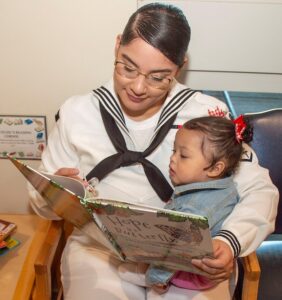
Story by Douglas Stutz
Naval Hospital Bremerton/Navy Medicine Readiness and Training Command Bremerton
The roles of U.S. Navy hospital corpsmen are varied in support of those in need, including 39 specialties such as behavioral health technician, Fleet Marine Force and physical therapy technician.
Corpsmen are also known to take added responsibilities, even handling impromptu librarian and storyteller duties for young pediatric patients at Navy Medicine Readiness Training Unit Everett.
Families bringing their children to the David R. Ray Clinic for a pediatric clinic appointment are afforded the opportunity before and after their appointment to actively – visually and aurally – peruse a number of donated children’s books, including those from the Reach Out and Read program. The non-profit organization provides age-appropriate books to a national network, which includes military treatment facilities, to help encourage the importance – and fun – of reading at a young age.
There is a special designated literacy area in the clinic, aptly titled Dr. Lukezic’s Reading Corner, where patients are encouraged to read a book while waiting and even borrow to return on their next appointment.
“It helps our families and promotes literacy and resiliency,” stated Dr. Renate Lukezic, board certified pediatrician, noting that Navy families she provides care for really appreciate having access to a pediatrician.
“Pediatricians are specifically trained to take care of children from the newborn period through young adulthood. It is my opinion that we really need to empower the entire family to meet their health goals. I know there are multiple definitions of health but the one that speaks the most to me is, ‘health is a state of complete physical, mental and social well-being and not merely the absence of disease or infirmity,’” added Lukezic.
That health also extends to literacy. Lukezic affirms that families she sees often have health goals that include quiet times, soothing times and increased family time.
“Reading books helps with all of these health goals. Families also wonder what they can do to help their children with developmental milestones and given that the Reach Out and Read books are specific for ages and milestones, it helps with this too,” explained Lukezic. “And not just social and verbal skills. Manipulating books helps with fine motor and gross motor skills at any age. And infants learn through tasting everything, so I do expect a six-month old baby to taste a book and learn from that too.”
Lukezic considers having books readily available are a part of the clinic’s well child process.
“It’s priceless. The visit becomes more fun. The children are less anxious. A corpsman can talk about the colors of the book or what picture is on the cover. One time a corpsman handed a four-year old a book. The children on the cover were frustrated, so the child asked why they were sad. It turns out they were having a rotten day. We all have those, so it’s important to learn how to handle a bad day too. But it also struck me that this four year boy was able to quickly read the facial expressions and ask empathetically what was going on – that’s a great life skill,” remarked Lukezic.
The literary corner in the waiting room acts as a beacon to the young children. While these books are not all Reach Out and Read specific, they are books Lukezic chose for a wide variety of ages to enjoy.
“One morning, every time I passed through the waiting room, I saw a different family reading with their child. What a wonderful opportunity. I heard families talking about sharks, physics and even economics,” shared Lukezic.
“I encourage families to read to their baby from the very first day,” Lukezic continued. “In the first three years of life, a million neural synapses are connecting every few seconds. Literally, the parents are growing their baby’s brain. Newborn babies will find everything exciting. Even technical manuals because they love to listen to their parents’ voices.”
Or even the tone from a storytelling hospital corpsman.